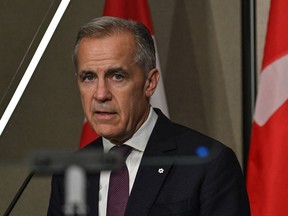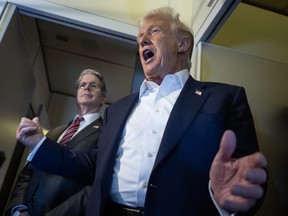Politics
Carney’s Trade Promises Falter as Trump Suspends Negotiations

The recent suspension of trade negotiations by U.S. President Donald Trump has intensified scrutiny on Prime Minister Mark Carney‘s trade commitments. This marks the second occasion this year where Carney has assured Canadians that a resolution to the ongoing trade conflict was imminent, only for talks to collapse unexpectedly. The latest setback occurred after Trump announced on October 21, 2023, that he would not proceed with negotiations, opting instead to increase tariffs on Canadian goods.
A Timeline of Promised Resolutions
Earlier in 2023, the Carney administration had indicated that July 21, 2025, would be a pivotal date for restoring normal trade relations between Canada and the U.S. This timeline emerged from discussions during the G7 Summit in Kananaskis, Alberta, where Carney stated that Trump had committed to pursuing negotiations within the following month. Originally set for June 16, the deadline was subsequently extended and became a focal point for trade expectations.
On June 29, Carney announced the unilateral cancellation of the Digital Service Tax in an effort to facilitate ongoing negotiations. He emphasized that this move was aligned with the timeline established at the G7 summit. However, the anticipated resolution was pushed back to August 1 and eventually abandoned as Trump imposed an additional 10 percent on Canadian tariffs.
Throughout October, while Carney’s office refrained from setting specific deadlines, hints dropped by government officials suggested that a trade resolution could be forthcoming. Yet, as negotiations continued in Washington, Trump’s abrupt decision to halt talks dashed these hopes. Notably, Canada remains the only G7 nation without a tariff relief agreement following the U.S. Administration’s tariff impositions on its trade partners.
Political Reactions and Implications
In his address to the House of Commons on October 8, 2023, Carney expressed optimism, stating that Canada was positioned to secure “an even better deal” than other nations negotiating with the U.S. He pointed out that Canadian exports are mostly exempt from U.S. tariffs under the terms of the Canada-United States-Mexico Agreement (CUSMA). Carney’s minister of intergovernmental affairs, Dominic LeBlanc, also conveyed urgency in securing trade agreements, directing his team to “quickly land” deals.
Despite the optimism, Trump’s announcement on October 21 shocked many. He attributed the breakdown in negotiations to a controversial advertisement aired in Ontario, which referenced anti-tariff statements made by former U.S. President Ronald Reagan. During a press conference, Trump indicated that he had no plans to resume negotiations and criticized the Canadian delegation, stating he would not engage with Carney for a “long time.”
Carney later responded, asserting that his negotiators had made “considerable progress” and expressed readiness to return to the table whenever the U.S. was prepared to resume discussions. The situation underscores the unpredictable nature of international trade negotiations and the challenges facing the Canadian government in securing favorable outcomes.
As Canada navigates these tumultuous trade waters, the implications of the stalled negotiations are significant for Canadian businesses and workers. The uncertainty surrounding trade relations with the U.S. continues to impact economic planning and growth prospects across the nation.
-

 World3 months ago
World3 months agoScientists Unearth Ancient Antarctic Ice to Unlock Climate Secrets
-

 Entertainment4 months ago
Entertainment4 months agoTrump and McCormick to Announce $70 Billion Energy Investments
-

 Lifestyle3 months ago
Lifestyle3 months agoTransLink Launches Food Truck Program to Boost Revenue in Vancouver
-

 Science4 months ago
Science4 months agoFour Astronauts Return to Earth After International Space Station Mission
-

 Technology2 months ago
Technology2 months agoApple Notes Enhances Functionality with Markdown Support in macOS 26
-

 Top Stories2 weeks ago
Top Stories2 weeks agoUrgent Update: Fatal Crash on Highway 99 Claims Life of Pitt Meadows Man
-

 Sports3 months ago
Sports3 months agoSearch Underway for Missing Hunter Amid Hokkaido Bear Emergency
-

 Politics3 months ago
Politics3 months agoUkrainian Tennis Star Elina Svitolina Faces Death Threats Online
-

 Technology3 months ago
Technology3 months agoFrosthaven Launches Early Access on July 31, 2025
-

 Politics3 months ago
Politics3 months agoCarney Engages First Nations Leaders at Development Law Summit
-

 Entertainment3 months ago
Entertainment3 months agoCalgary Theatre Troupe Revives Magic at Winnipeg Fringe Festival
-

 Politics2 weeks ago
Politics2 weeks agoShutdown Reflects Democratic Struggles Amid Economic Concerns



















